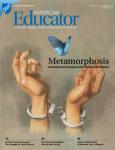
Will a new generation of science standards improve the teaching of science? Writing in the summer 2012 issue of American Educator, Michael Berkman and Eric Plutzer, the Pennsylvania State University political science professors who coauthored Evolution, Creationism, and the Battle to Control America's Classrooms (Cambridge University Press, 2010), offer (PDF) their view: "We see a rough road ahead for teachers." Noting that A Framework for K-12 Science Education — on which the Next Generation Science Standards now under development are based — emphasizes the centrality of evolution in the life sciences, they note that evolutionary biology is poised to become "much more salient for many teachers who have never before had to teach it." They add, "Understanding the challenges of teaching evolution has increasing relevance, therefore, across the science curriculum and speaks to more general debates concerning the importance of teachers having deep content knowledge."
After discussing the basis for the scientific consensus on evolution, Berkman and Plutzer review the current public opinion polls on teaching evolution and creationism in the public schools, the religious roots of antievolutionism, and their own national poll of public high school biology teachers, which revealed that only 28% are "clear advocates of evolutionary biology," while 13% are advocates of creationism and 60% are in the "cautious middle," many of whom "do not feel like they have the expertise they need to confidently teach evolutionary biology in a rigorous and unapologetic manner." Emphasizing the importance to society of a sound science education, they express hope that "educators will be supported by their administrators and community members so they can teach evolution, climate change, the antiquity of the universe, and any other socially controversial subject with the same commitment to scientific accuracy as when they teach other topics in science."
